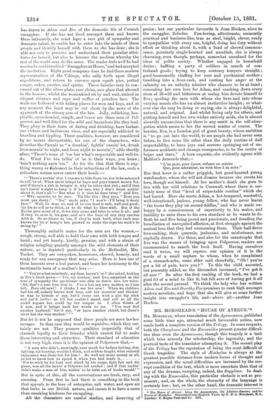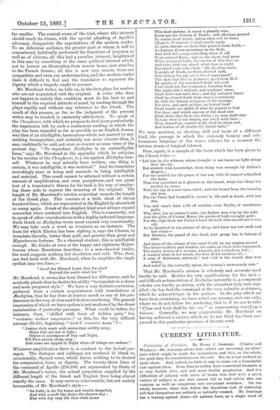MR. MORSHEAD'S "HOUSE OF ATREUS."* MR. MORSRELD, whose translation of
the Agamemnon, published some little time ago, attracted much favourable notice, now sends forth a complete version of the Trilogy. In some respects, both the Choephoroi and the Eumenides present greater difficul- ties than even the Agamemnon, though this tragedy is a task which tries severely the scholarship, the ingenuity, and the poetical taste of the translator attempting it. The second play of the Trilogy has the reputation of being the most difficult of Greek tragedies. The style of Eschylus is always at the greatest possible distance from modern forms of thought and expression, and the usual difficulties are increased by the cor- rupt condition of the text, which is more uncertain than that of any of the dramas, excepting, indeed, the Supplioes. In deal- ing with the Eumenides, this particular obstacle is not so pro- minent; and, on the whole, the obscurity of the language is certainly less ; but, on the other hand, the dramatic interest is
* The House of Atreus : being the Agamemnon. the Libation-Itearers, and the Furies of .Esehylus. Translated into English Terse by E. D. A. Morshead, ISLA. London ; 0. Kogan Pauland Co. 1E81.
far smaller. The central scene of the trial, where this interest should reach its climax, with the special pleading of Apollo's advocacy, disappoints the expectations of the modern reader. To an Athenian audience, the greater part of whom, it will be remembered, habitually performed the functions of jurymen as well as of citizens, all this had a peculiar interest, heightened in this case by something of the same political interest which, not to borrow an illustration from nearer home, now attaches to the French Senate ; all this is now very remote from our sympathies and even our understanding, and the modern reader finds it difficult to feel and the translator to represent the dignity which a tragedy ought to possess.
Mr. Morshead writes, he tells us, in the first place for readers who are not acquainted with the original. A critic who does not happen to satisfy this condition must do his best to put himself in the required attitude of mind, by reading through the plays rapidly and without any reference to the Greek. The result of this process, as far as the judgment of the present writer may be trusted, is eminently satisfactory. To speak of the Choephoroi, with which we propose to deal more particularly, the impression left by such a continuous reading, in which the play has been regarded as far as possible as an English drama, was that of an intelligible, harmonious whole, not marred by any striking incongruities, and certainly not more obscure than, it may confidently be said, not even so obscure as some verse of the present day. "To reproduce rEschylus in an unintelligible form," says Mr. Morshead in the appendix which he subjoins to his version of the Choephoroi, is a sin against Inchylus him- self. Whatever he may actually have written, one thing is certain, it was intelligible, it was metrical." And his translator accordingly aims at being and succeeds in being intelligible and metrical. This result cannot be attained without a certain amount of amplification, and even paraphrase, and one great test of a translator's fitness for his task is his way of employ- ing these aids to express the meaning of his original. The length of Mr. Morshead's version somewhat exceeds the length of the Greek play. This consists of a little short of eleven hundred lines, which are represented in the English by about half as many again. Greek of the simplest kind must always expand somewhat when rendered into English. This is a necessity, not to speak of other considerations with a highly-inflected language. Such Greek as 2Eschylus wrote must expand very considerably. We may take such a word as 6.repi3opios as an instance. The boon for which Electra has been sighing is, says the Chorus, to translate literally, better than gold, and greater than great and Hyperborean fortune. To a classical student, this is intelligible enough. He thinks at once of the happy and righteous Hyper- borean whom Herodotus describes ; to a non-classical reader, the word suggests nothing but desolation and cold. Who, then, can find fault with Mr. Morshead, when he amplifies the single epithet into two lines,— " As of the Blessed Land, that far aloof Beyond the north wind lies "?
Mr. Morshead, it seems, has been blamed for diffuseness, and he modestly pleads that he doubts his ability "to translate in a closer and more pregnant style." We have a very distinct conviction, gathered from a certain acquaintance with translations of lEschylus, that he has done at least as much as any of his pre- decessors in the way of close and felicitous rendering. The general impression of which we have spoken is not weakened by the closer examination of particular passages. What could be better, for instance, than, "chilled with frost of hidden pain," for,
" xPtledois zidurni waXvolitAiva ;" or this, for the very difficult passage (61-65), beginning, "60nie EMCM07:11 Aims; "?— " Justice cloth mark with scales that swiftly sway,
Some that, are yet in light ; Others in interspace of Day and Night, Till Fate arouse them, stay; And some are lapped in Night when all things are undone."
Whatever amplification there is, is confined to the lyrical pas- sages. The dialogue and soliloquy are rendered in blank or, occasionally, rhymed verse, which leaves nothing to be desired for compression, force, or dignity. The twenty-three lines of the command of Apollo (274-296) are represented by thirty of Mr. Morshead's verses, the actual proportion supplied by the different length of the Greek and English lines being almost exactly the same. It may serve as a favourable, but not unduly favourable, of Mr. Morshead's style :— "Go forth, in ire for home and wealth despoiled, And with a craft like theirs the slayers slay Else with thy very life thou shalt atone This deed undone, in many a ghastly wise. Stern are the Powers of Death ; and offerings poured To soothe their wrath, unless their will be done, (Hear it, 0 mortals !) shall exude again
As grim disease on them that poured them forth,—
As leprous ulcers mounting on the flesh, And with fell pangs corroding what of old Wore natural form ; and on the brow shall grow White poisoned hairs, the crown of this dise:.se. And thou shalt cry aloud, what time in night The spirit's eye sees clear, Ah, al), they come, Legends of fiends, to their allotted task, Sent hither, for my sire's blood unavenged!' The dart that flies in darkness, sped from Hell By spirits of the murdered dead, who call Unto their kin for vengeance, formless fear, The night-tide's visitant, and madness' curse, Shall drive and rack thee ; and thy tortured frame Shall be chased forth from man's community As with the brazen scorpions of the scourge. For thee, and such as thee, no lustre! bowl Shall stand—no spilt!) of wine be poured to God For thee ; and wrath unseen of thy dead sire Shall drive thee from the shrine ; no man shall dare
To take thee to his hearth, nor dwell with thee,—
Slow, friendless, cursed of all, shall be thine end, And horror of all deaths thy burial balm."
We may mention, as showing skill and taste of a different kind, the passage in which the curiously homely and sub- humorous language of the nurse relieves for a moment the intense strain of tragical interest.
Here, again, is a sample of the form which has been given to the Choral Odes :— " Let him be the witness, whose thought is not borne on light wings thro' the air, Bat abideth with knowledge, what thing was wrought by Althea's despair ; For she inared the life-grace of her son, with ill counsel rekindled the flame That was quenched as it glowed on the brand, what time from his mother he came, With the cry of a new-born child ; and the brand from the burning she won, For the Fates had foretold it coeval, in life and in death, with her son.
Yea,andman's hate tells of another, even Scylla, of murderous guile,
Who slew, for an enemy's sake, her father, won o'er by the wile And the gifts of Cretan Minos, the gauds of high-wrought gold ; For she clipt from her father's head the lock that should never wax
old,
As lie breathed in the silence of sleep, and knew not her craft and her crime— But Hermes, the guard of the dead, doth grasp her, in fulness of time.
And since of the crimes of the cruel I tell, let my singing record The bitter wedlock and loveless, the curse on these halls outpoured, The crafty device of a woman, whereby did a chieftain full,— A warrior stern in his wrath, the fear of his enemies all,— A song of dishonour, untimely ! and cold is the hearth that was warm, And ruled by the cowardly spear, the woman's unwomanly arm."
That Mr. Morshead's version is scholarly and accurate need hardly be said. Besides his own qualifications for his task— and difficult as translation of /Eschylus naturally is, a competent scholar can hardly go astray, with the abundant help now sup- plied—he has had the command of the very valuable assistance, which he acknowledges in his preface. In the play which we have been examining, we have noted one passage, and one only, where we do not follow his rendering, that is, if we are to take "Clear and loud shall be his cry" as representing e:rovi'4Erixt Asia 1:6110. Generally, we may congratulate Mr. Morshead on having achieved a success which we do not think has been sur- passed in this particular province of literary work.



































 Previous page
Previous page